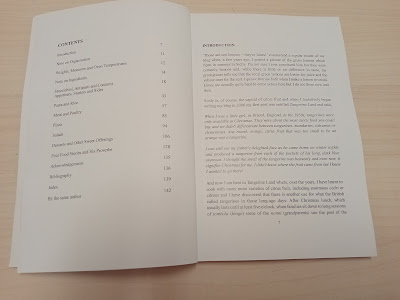In the midst of a situation so
horrendous that most of us cannot bear to look at the images, an
eighty-five-year-old Israeli woman who has just been released turns
and holds out her hand towards (I am choosing my words carefully
here) a member of the organisation that had held her captive.
During a press conference held later
Yochevid Lifshiz said she had done so because the man, a paramedic,
had treated her kindly and, with others, had attended to her physical
needs. She has been criticised for her gesture, but from what I have
read since, I gather that the criticism was really directed at the
way in which the press conference was handled. Mrs Lifshiz may also
have been thinking of her husband, still being held as far as we
know, or she may have taken pity on the man's youth. Or perhaps she
was simply offering a gesture of humanity in an absurd situation, and
I mean “absurd” in the horrific sense.
It has always interested me that in
English we talk of a “theatre” of war to denote geographical
location and that we also understand the concept of the “theatre of
the absurd”. Is there not a connection? Is it not absurd that in
the twenty-first century, with the tragedy of World War II still
(just) in living memory, we resort to war to attempt to resolve our
differences? War – in which the innocent are always hurt. War, in
which there are always terrible deeds because war itself is terrible.
There has been much talk in recent weeks about the “rules of war”
and surely if we can have rules of war, we can have “rules of
peace”, rules to which all nations would adhere? Yet we who are
fortunate enough, thus far, not to have experienced war in our
homelands cannot know what we would do and for the moment we just
look at our many screens and wish that it would stop around the
world.
My own interest in the theatre of the
absurd began with the study of French literature and it is to France
that I turn now to bring to your attention an article, about a
“theatre of war” from long ago, posted by the BBC on 27th
August this year. At the time, the events recounted in it stopped me
in my tracks but I certainly did not expect it to seem so relevant
just a few weeks later: Near the town of Meymac in Corrèze, central
France, a ninety-eight-year-old former Resistance fighter, as the
last surviving witness, recently decided to speak out about the mass
execution there of German soldiers by the Resistance. This was
because a German army division had killed ninety-nine hostages in
Tulle and 643 civilians in the village of Oradour-sur-Glane in
retaliation for a Resistance uprising. (Preparations for D-Day had
been underway.) The soldiers were made to dig their own graves and
afterwards faced the firing squad bravely. Coins, bullets and other
objects dating from the period have been found at what was the
execution site but no human remains have yet been located. The
Corrèze prefecture and Mayor are determined to find the remains of
the soldiers, exhume them and, presumably, bury them in a fitting
way. In
war, says the Mayor, “You can be on the side of the righteous and
still carry out what is morally wrong” and this is the sentence
that so impressed me in August. As I have said, all sides carry out
terrible deeds in war because war itself is terrible.
Do
I have an answer for this? No, and neither do presidents, prime
ministers, generals and diplomats who are much more knowledgeable
than I am. I can only say that peace must be not only the outcome,
but peace must be the way.
Of
course, no one can negotiate with a tyrant or a fanatic but
sometimes, perhaps, it is possible to offer a gesture of humanity: On October 23rd, an eighty-five-year-old Israeli woman who had just been released
turned and held out her hand towards a member of the organisation
that had held her captive. That day, she walked in peace.
With thanks, as always, to Mimi Lenox, who inspires us all to blog for peace.


































